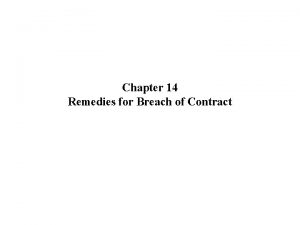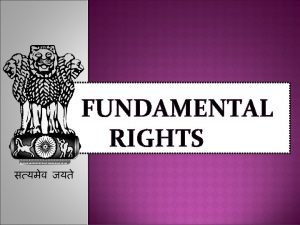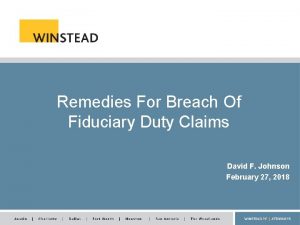Indian Contract Act Discharge of Contract Remedies for











- Slides: 11

Indian Contract Act Discharge of Contract Remedies for breach of Contract Indemnity and Guarantee Agency | Prof. Pradip Kumar Ghosh. | pradip. ghosh@iemcal. com | 1

Discharge of Contract • Discharge by Agreement ( Sec. 62 and 63 ) • By new contract ( novation) • By alteration • By recession - by the aggrieved party or the party whose consent was not free • Discharge by performance or offer to perform. • Discharge by operation of law • • Insolvency Merger ( Owner from Lessee ) Alteration without the consent of the other party Death ( in case performance in person was required ) • Breach of Contract – Actual or Anticipatory breach • Declaration of war / Strike, Lockout , Civil disturbance / Force Majeure • Anticipatory breach of contract : Communication of inability to perform before the date of performance. • Discharge by lapse of time under limitation act | Prof. Pradip Kumar Ghosh. | pradip. ghosh@iemcal. com | 2

Remedies for Breach of Contract Cancellation or Recession Restitution : Return the benefit Injunction Quantum Merit : Payment in proportion to the quantity of work done • Damages • • • Nominal • General • Special ( when the financial implication of the breach was known in advance ) • Vindictive • In general, injured party cannot get damages in excess of loss ( i. e. damage cannot be in the nature of penalty ) ( Sec 74 ) | Prof. Pradip Kumar Ghosh. | pradip. ghosh@iemcal. com | 3

Indemnity & Guarantee | Prof. Pradip Kumar Ghosh. | pradip. ghosh@iemcal. com | 4

Rights of the Guarantor ( Surety) • Right of Subrogation against the principal debtor ( Sec. 140) • Right of Indemnity against the principal debtor ( Sec. 141 ) • Rights of Security against the creditor • i. e. Creditor should not release any security against the principal debtor, without the consent of the Surety • Acts of errors and omission by the creditor visà-vis principal debtor, removes liability from surety. | Prof. Pradip Kumar Ghosh. | pradip. ghosh@iemcal. com | 5

Continuing Guarantee • A guarantee, which extends to a series of transactions, and which is valid until revoked is a continuing guarantee. • A agrees to guarantee a price of Rs. X per ton for any quantity supplied anytime, by B to C, until revoked. • A continuing guarantee is revoked by : • • • Notice of revocation Death of Surety Creditor’s act of omission Novation ( a new contract without involving the surety) When the creditor discharges the principal debtor | Prof. Pradip Kumar Ghosh. | pradip. ghosh@iemcal. com | 6

Agency • • • Sec. 182. "Agent" and "principal" defined An "agent" is a person employed to do any act for another, or to represent another in dealing with third persons. The person for whom such act is done, or who is so represented, is called the "principal". Sec. 183. Who may employ agent Any person who is of the age of majority according to the law to which he is subject and who is of sound mind, may employ an agent. Sec 184. Who may be an agent – As between the principal and third persons, any person may become an agent, but no person who is not of the age of majority and sound mind can become an agent , so as to be responsible to the principal according to the provisions in that behalf herein contained. Sec. 185. Consideration not necessary No consideration is necessary to create an agency; Sec. 201. Termination of Agency An agency is terminated by the principal revoking his authority, or by the agentrenouncing the business of the agency; or by the business of the agency being completed; or by either the principal or agent dying or becoming of unsound mind; or by the principal being adjudicated an insolvent under the provisions of any Act for the time being in force for the relief of insolvent debtors. | Prof. Pradip Kumar Ghosh. | pradip. ghosh@iemcal. com | 7

Test of Agency • Whether the ‘agent” has capacity to bind the “principal” to third parties, by the agent’s action. • Whether the “agent” can create a legal relation between a third party and the “principal” through agent’s action. • An employee is not an agent • An independent contractor is not an agent • A bailee is not an agent • A trustee is not an agent • Wife is an agent of husband to the extent of necessities for living, but not beyond that unless specifically authorized. | Prof. Pradip Kumar Ghosh. | pradip. ghosh@iemcal. com | 8

Kinds of Agency • By express agreement • Agency by implication – By estoppel ( person collecting rent for the owner) – By holding out (brother collecting rent for the brother) – By necessity ( person dispatched a horse by rail, did not take delivery at destination, railway co. had to feed the horse to keep it alive) – By ratification ( post facto confirmation of agency ) | Prof. Pradip Kumar Ghosh. | pradip. ghosh@iemcal. com | 9

Agent’s Duty to Principal • Duty to act according to principal’s direction ( Sec. 211) • Duty to tact with reasonable skill and diligence ( Sec. 212 ) • Duty to render accounts ( Sec. 213) • Duty to communicate ( Sec. 214 ) • Duty not to deal on his own account ( Sec. 215 & 216) • Duty to pay over all money and dues ( Sec. 218) • Duty not to delegate ( Sec 219) | Prof. Pradip Kumar Ghosh. | pradip. ghosh@iemcal. com | 10

Rights of an Agent • Right to remuneration ( Sec. 219 and 220) • Right to retain principal’s money until his remuneration is paid ( Sec. 217) • Right of lien on goods and documents of principal ( Sec. 221) • Right to be indemnified against consequences of lawful acts and acts done in good faith ( Sec. 222 and 223) • Right to compensation against principal’s negligence ( Sec. 225 ) | Prof. Pradip Kumar Ghosh. | pradip. ghosh@iemcal. com | 11
 Remedies for breach of contract
Remedies for breach of contract Remedies for breach of contract
Remedies for breach of contract Remedies for breach of contract
Remedies for breach of contract Remedies for breach of contract
Remedies for breach of contract Nature of indian contract act 1872
Nature of indian contract act 1872 Consideration 2(d)
Consideration 2(d) Indian contract act 1872
Indian contract act 1872 Right to constitutional remedies article 32 to 35
Right to constitutional remedies article 32 to 35 Remedies for breach of fiduciary duty
Remedies for breach of fiduciary duty Acid rain remedies
Acid rain remedies Washington homeopathic pharmacy
Washington homeopathic pharmacy Rationalization groupthink
Rationalization groupthink





















